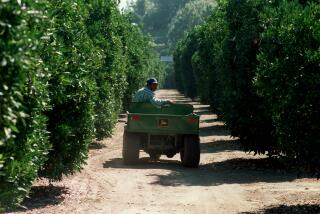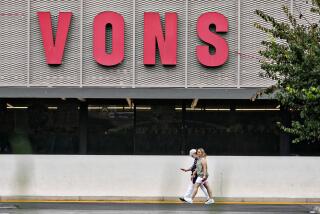Some residents fear Wal-Mart would threaten Altadena’s identity
Dinner was nearly on the table, but Veronica Nuno had forgotten ingredients for the salad. The 54-year-old Altadena resident headed for a nearby market, warning her husband, “We’re going to pay an arm and a leg.”
Nuno, a teacher, usually treks to the Wal-Mart Supercenter in Rosemead for food bargains — sometimes seeing prices half what is charged at other groceries. She is counting down the months until the Wal-Mart grocery opens in her hometown.
But not all her neighbors share her view. Wal-Mart Stores Inc.’s plan to open a neighborhood market in Altadena early next year has exposed a rift among locals over a basic issue: food.
While some residents see cheaper groceries as a boon, others are passionate advocates of organic and sustainable agriculture. They view the retail giant’s plan as an anathema threatening Altadena’s identity.
An unincorporated area of 43,000, Altadena has fought off annexation for decades from its southern neighbor Pasadena, preferring Los Angeles County rules instead. In a place where residents are allowed to raise chickens and goats and it’s common to cultivate and share backyard bounty, food can be a sensitive issue.
“There’s kind of a whole quiet food subculture and that’s been here since I can remember,” said Steve Lamb, 54, a former member of Altadena’s advisory council. “I grew up in Altadena and we grew all our own vegetables in the backyard. I was astounded as a teen by how terrible food out of the store was. It’s a really peculiar place to put a Wal-Mart — it’s the most illogical fit I can conceive of.”
Wal-Mart has 27 locations in Los Angeles County, including 15 supercenters, but has recently made a push to compete with local groceries. It touts its neighborhood markets as affordable, healthy food markets that take up less space than its retail stores.
The Arkansas-based retailer has signed a lease on a 28,000-square-foot store at the intersection of Lincoln Avenue and Figueroa Drive that has stood empty for three years. The company has also expressed interest in an empty lot on Lake Avenue and Calaveras Street, less than three miles away.
Some residents believe the town would be better served by a Whole Foods or Trader Joe’s. “Wal-Mart is just a cheesy, cheap replacement for that,” said Jeff Herring, 42, co-founder of the Altadena Bicycle Club.
Herring and others cite Altadena’s various food movements — a community co-op in the works, a high school that grows and delivers organic produce to paying subscribers, an institute that offers classes in “foodcrafting” and aims to impassion people about ingredients and their source — as evidence of values that oppose big box chain stores.
But unlike Chinatown, where opposition has mounted against Wal-Mart’s plans to build a neighborhood market, Altadena never had the opportunity to block the store. The company is leasing, not requesting to build, and the area is already zoned for a grocery.
Nonetheless, hundreds of residents have attended community meetings about the coming store, accusing Wal-Mart of mistreating employees and decimating businesses. A grass- roots group called Save Altadena plans to petition the Los Angeles County Board of Supervisors for a moratorium on permits for chain outlets of more than 15,000 square feet, which could impede the store’s opening.
Supporters argue that many Altadena residents can’t afford to shop at farmers markets and have little time to garden. They also hope Wal-Mart will revitalize a business strip of working-class mom-and-pop shops.
“That’s a blight area there. A lot of us are very happy Wal-Mart’s coming,” said Tecumseh Shackelford, whose council term expired last month. “Everybody can’t afford organic food. Some people can and that’s great. But we have family people here who have kids.”
According to Shackelford, dozens of people signed up to be notified about Wal-Mart jobs. Among them was John Whaley, a 58-year-old pastor at a small South Los Angeles church, and his 22-year-old son. The two live in walking distance of the site and are looking for extra income to pay off college loans.
“We want to give it a chance at least,” Whaley said. “I don’t think people are seeing the big picture here, which is, it’s opening up a lot of jobs.”
Other residents welcome a market that can compete with Ralphs and Super King, a sprawling grocery that arrived four years ago. “Why should they be the only one who gets our business? Wal-Mart will cater to everybody and the prices will be a little lower,” said Wayne Nelson, who has lived in Altadena for 55 years.
Wal-Mart, in fact, chose the area because it appeared underserved in terms of access to healthy, affordable groceries, said Rachel Wall, a company spokeswoman. She said the company makes an effort to source locally grown and organic produce.
“At our Huntington Beach store our very first produce item was strawberries from Los Kitos from their farm in Salinas,” Wall said.
Still, many residents can’t get past the company’s business model where low food prices mean low wages for Wal-Mart employees and more pressure on competing businesses.
Leticia Vega’s modest convenience store barely stayed afloat after Super King came to her street. Despite praise for the menudo, tortas and burritos she sells on the side, she doubts Poncitlan Meat Market can survive an incoming Wal-Mart.
“They’re going to pretty much clean us out,” Vega, 44, said. “I’m out of my league.”
More to Read
Inside the business of entertainment
The Wide Shot brings you news, analysis and insights on everything from streaming wars to production — and what it all means for the future.
You may occasionally receive promotional content from the Los Angeles Times.











